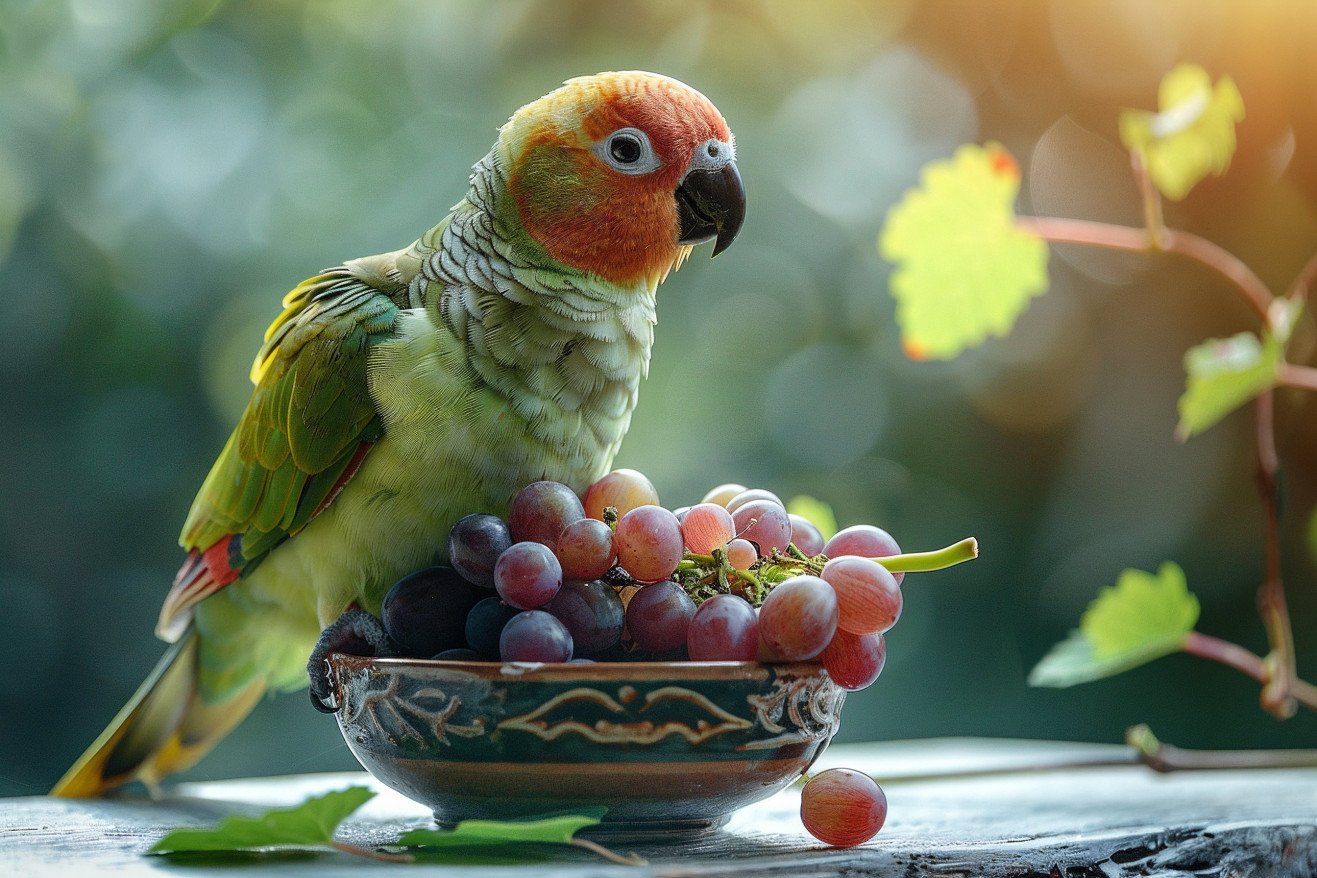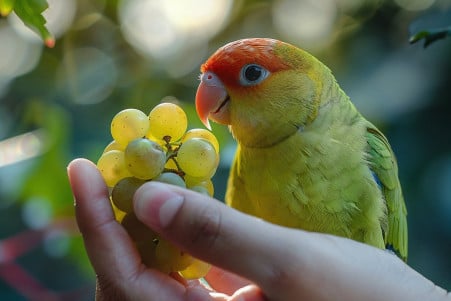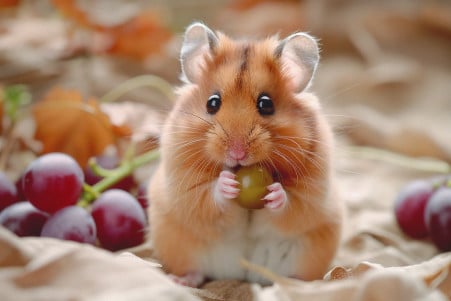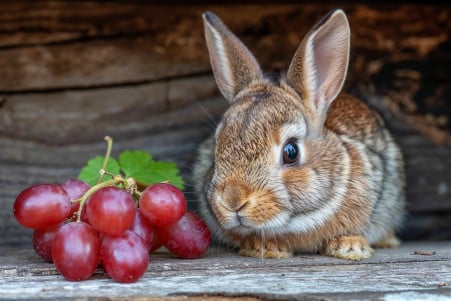Can Parrots Have Grapes? Here’s What You Need to Know
14 May 2024 • Updated 13 May 2024

If you have a pet parrot, you’ve probably wondered about the safety of feeding them certain fruits, and grapes are a popular choice. While grapes are safe for parrots to eat, they do have some nutritional drawbacks. For example, grapes are high in sugar, but they also have vitamin C and antioxidants.
This article will take a deep dive into the science of feeding grapes to parrots to help you understand the pros and cons. By looking at research on the nutritional content of grapes, portion sizes and how often grapes can be fed to parrots, and the risks of feeding grapes to parrots, you can learn how to best feed your parrot grapes to ensure they’re healthy and happy.
Can parrots eat grapes?
Nutritional Benefits of Grapes for Parrots
Grapes have several nutritional benefits that can make them a valuable treat for parrots. First, they are an excellent source of hydration, as they are made up of over 80% water and can help birds stay hydrated. Grapes are also packed with vitamins and minerals that are important for parrot health, including vitamin C, vitamin K, copper, and manganese.
In addition, grapes contain antioxidants, including resveratrol, that can help boost parrots' immune systems and keep them healthy. The natural sugars in grapes can give parrots a quick energy lift, which can be especially helpful for birds that are particularly active. That said, as The Parrot Club explains, grapes' sugar content means they should be fed in moderation as part of a well-rounded diet.
Other fruits, including bananas, berries, and apples, can provide many of the same nutritional benefits when they are fed as part of a balanced diet. These fruits are packed with vitamins, minerals, antioxidants, and natural sugars that can help keep parrots healthy and energized. By rotating through different fruits, parrot owners can make sure their birds get a variety of nutrients.
How to Feed Grapes to Your Parrot
Grapes should be given to parrots in moderation because of their high sugar and calorie content. According to the Avian Avenue Parrot Forum, many experts suggest that grapes and other fruits should make up only 10-20% of a parrot's diet. The amount of grapes that should be fed to a parrot each week depends on the size of the bird, with recommendations ranging from 1-2 grapes for small parrots to 3-4 grapes for larger parrots. Parrot Junkie adds that feeding parrots too many grapes can lead to obesity, vitamin deficiencies, and other health issues.
Grapes should be washed, deseeded, and cut into small pieces to avoid choking hazards. It's important to make sure that parrots are eating a balanced diet that includes a variety of fruits, vegetables, and pellets.
How to Monitor Parrot Health and Watch for Signs of Overfeeding
Parrots that are overweight will have a keel bone that is less pronounced and fat deposits instead of muscle, according to Obesity In Parrots. Digestive issues like diarrhea, vomiting, regurgitation, and abnormal droppings can also be signs of overfeeding or an unbalanced diet, according to Recognizing the Signs of Illness in Pet Birds and Digestive Problems in Birds.
Other signs of illness that can be linked to diet include lethargy, feather staining, and changes in appetite or droppings. The Merck Veterinary Manual also lists a number of digestive disorders that can impact parrots.
If any of these symptoms are noticed, it is important to take the parrot to the vet as soon as possible. It is also important to regularly monitor a parrot's weight, droppings, and general well-being after introducing new foods like grapes to their diet to ensure they are healthy and thriving. By keeping an eye out for signs of overfeeding and other potential health issues, parrot owners can ensure they make any necessary adjustments to their pet's diet and care.
How to Switch to a Better, More Balanced Diet for Your Parrot
According to Encouraging Nutrition in Picky Parrot by the World Parrot Trust, the key to getting parrots to accept new, healthier foods is to do it slowly. This means offering small amounts of new foods alongside the old. It can also help to try different ways of preparing the food, as well as different textures and temperatures. This is also suggested in How to Introduce New Foods To Picky Parrots.
In addition, using clicker training and positive reinforcement can help encourage parrots to eat new foods, according to Parrot | Changing the diet - picky eater by The Bird School. It's also a good idea to talk to an avian vet for personalized advice and recommendations on what to feed your parrot to make sure they're getting a well-balanced diet that meets their needs.
More Healthy Fruits for Parrots
In addition to grapes, there are several other fruits that are safe and healthy for parrots to eat. According to Parrot Essentials, some of the best fruits to feed your parrot include bananas, papaya, berries, cherries, starfruit, apples, cranberries, figs, oranges, watermelon, and apricots.
Parrots love bananas, and their soft, sweet texture makes them an easy favorite for many birds. The Aviator Harness even says that the peel can be used as a foraging toy for parrots. Berries like raspberries, strawberries, and blueberries are full of vitamins, minerals, and antioxidants that can help support a parrot's well-being. Apples and oranges are also good for parrots, but it's important to remove the seeds and pits before feeding them to your bird, according to The Spruce Pets.
It's important to feed parrots fruit in moderation, as the natural sugar content can be high. In general, fruit should only make up 10-20% of a parrot's diet, according to most experts. If you're unsure about how much fruit to feed your parrot, consult with an avian vet to make sure that your bird's diet is well-rounded and includes a good mix of fruits, vegetables, and pellets.
Conclusion: How to Safely Add Grapes to Your Parrot's Diet
Grapes can be a nutritious and delicious addition to a parrot's diet when they're introduced in moderation as part of a well-balanced meal plan. However, portion control is key and will depend on the size of your parrot to avoid overeating and other potential problems. It's also important to keep an eye on your parrot's weight, droppings, and general health when you're introducing new foods like grapes.
If your parrot is a picky eater, you can use positive reinforcement and a slow transition to get them to eat healthier foods. An avian veterinarian can help you come up with a diet plan that's tailored to your parrot's needs and that includes a variety of foods that are appropriate for their species to help them stay as healthy as possible.


